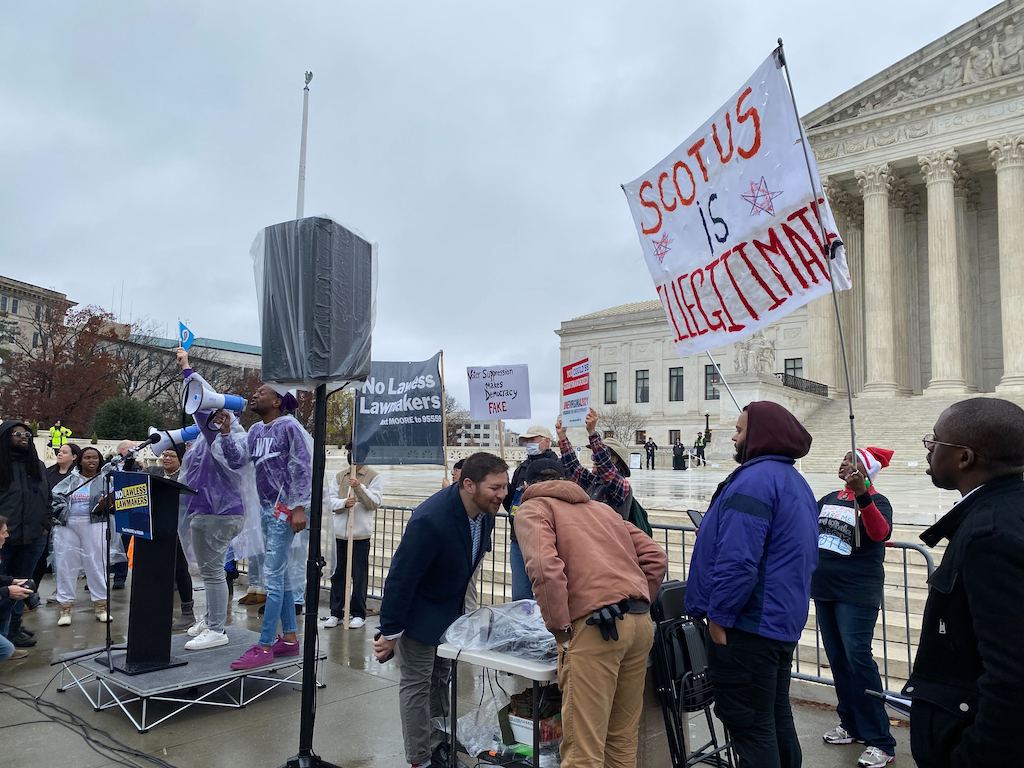WASHINGTON – The Supreme Court heard arguments Wednesday in an election dispute out of North Carolina that could reshape the balance of power in American electoral politics.
The case stems from a dispute between North Carolina’s legislature and state supreme court, which ruled that a gerrymandered redistricting map drawn by legislators was incompatible with the state constitution. The North Carolina State Supreme Court then drew a new map giving equal representation to Republicans and Democrats; the legislature then sued.
Attorneys for the North Carolina legislature are basing their argument on something called “independent state legislature” theory, which is the idea that state legislatures can regulate state and federal elections without input from the state courts and over the constraints of state constitutions.
Neither side is arguing that the North Carolina Supreme Court ruled unfairly; rather, attorney David Thompson contended that the state court did not have the authority to weigh in on the map in the first place.
“We say, ‘take the North Carolina Supreme Court’s decision on face value and as fairly reflecting North Carolina law,’ and when one does that, we see that there’s a violation of the Elections Clause, and that’s why we’re here,” Thompson said.
Some scholars worry about the potential broader implications of a ruling in favor of the independent state legislature theory.
“Although it’s called the independent state legislature theory, really the way it would function is to transfer power, not from state courts to the state legislature, but from state courts to the Supreme Court,” said Carolyn Shapiro, law professor and co-director of the Institute on the Supreme Court of the United States at Chicago-Kent College of Law.
She also filed an amicus brief on behalf of the plaintiffs.
“The U.S. Supreme Court would become the arbiter of all of these election disputes,” she said.
Justice Elena Kagan echoed those worries during oral arguments.
“This is a theory with big consequences,” she said. “It would say that if a legislature engages in the most extreme forms of gerrymandering, there is no state constitutional remedy for that, even if the courts think that’s a violation of the Constitution.”
That could impact federal elections on lots of levels, Kagan added.
“It would say legislatures could enact all manner of restrictions on voting, get rid of all kinds of voter protections that the state constitution in fact prohibits,” the justice said. “It might allow the legislatures to insert themselves, to give themselves a role in the certification of elections and the way election results are calculated.”
Shapiro worries this could create chaos in determining the results of the 2024 elections.
“You could imagine how things might have gone differently in Arizona, for example, in 2020, if the legislature had been in charge of deciding who really won, as opposed to having election professionals do and courts oversee the process,” she said.
This argument has drawn broad criticism from the right and left alike, but the previously obscure theory has gained new currency in conservative legal circles. Justices Neil Gorsuch, Clarence Thomas and Samuel Alito previously expressed support for the theory, Shapiro said.
“But all of those opinions were written when cases were on the shadow docket, and there was not full briefing and argument,” she said. “Moreover, since 2020, there has been an enormous amount of scholarship, in particular historical research, on the ISLT. That research demonstrates overwhelmingly that neither original intent, nor original public meaning, nor longstanding practice before and after the Constitution was drafted and ratified, support the ISLT.”
Attorneys for private and state respondents argued that the independent state legislatures theory is a significant deviation from centuries of precedent.
“For 233 years, this court has never second-guessed a state court interpretation of its own constitution in any context,” said former Solicitor General Neal Katyal, arguing on behalf of voting rights groups.
Thomas appeared skeptical.
“Let me ask this, just as it may be a bit unfair,” he said during arguments. “If the state legislature had been very, very generous to minority voters in their redistricting, and the state supreme court said under that this violated the state constitution of North Carolina, would
you be making the same argument?”
Justice Ketanji Brown Jackson expressed concerns about state legislatures superseding the authority of state constitutions.
“I guess what I don’t understand is how you can cut the state constitution out of the equation when it is giving the state legislature the authority to exercise legislative power,” she said. “It’s the state constitution that is telling the legislature when and under what circumstances it can actually act as the legislature.”
“Since Gorsuch, Thomas and (Brett) Kavanaugh, at least, are self-professed originalists, they should be willing to take a second look at their positions in light of all this new information,” Shapiro said.

